American Arcadia review: a stylish, cinematic neo-Truman Show platformer
We're having new age fun with a vintage feel
Have you ever watched critically acclaimed 1998 comedy drama The Truman Show and thought "What if the whole city was people who didn't know they were in a TV show?". That's kind of the deal with American Arcadia, a puzzle-platformer about a dude who lives in an ultra advanced dome city that is for some reason 70s-themed, and is also a huge reality show for the Twitch generation.
I actually love the 70s theme. This combined with story-within-a-story-within-a-story framing, bits of lovely, almost Wes Anderson-esque art design, and some extreme multi-tasking combining 2.5D and 3D makes American Arcadia an interesting little treat. Do the twists upon twists get a bit over cooked? Maybe. But you can live with it.
You could probably live with Trevor's day-to-day as well. He has a tortoise, a massive flat, a robot servant, and he doesn't really get out much. Which is the problem. American Arcadia the city is a utopia, but American Arcadia the TV show is losing money. Every unsuspecting star of the streaming service has to have their own cast of NPC actors to interact with, and if they're not interesting enough nobody will tune in to their dedicated cameras. Poor ol' Trevor has literally zero viewers. Well, he has one: a resistance member on the outside, who informs him he's about to be killed by the showrunners to remove his running costs.
This is Angela, and she guides Trevor through his desperate escape. You view Trevor mostly at a distance in 2.5D, as if you were Angela watching him on her screen at work, and must run and jump him through a mall, a hotel, and backstage at his office block where he discovers entire floors are full of dummies... As he goes, you can use Angela's remote hacking controls to open doors or control security systems to help him along. Sometimes you have to inhabit Angela in first-person 3D to do some stealth sections of industrial sabotage. On one memorable occasion you sort of do both at once.
What Trevor and Angela experience separately all comes together to peel back the layers of American Arcadia's history and workings for you, the player. From its conception as a Disney-esque Tomorrowland full of good livin' and electric cars, to its current incarnation where outsiders can take holidays into their favourite TV show set as long as they dress in era-appropriate flared trousers and orange sweater vests, the details are both sinister and desperately mundane, and are reinforced by the level design.
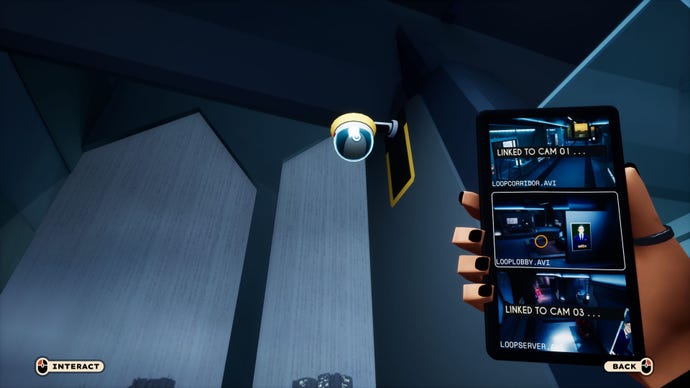
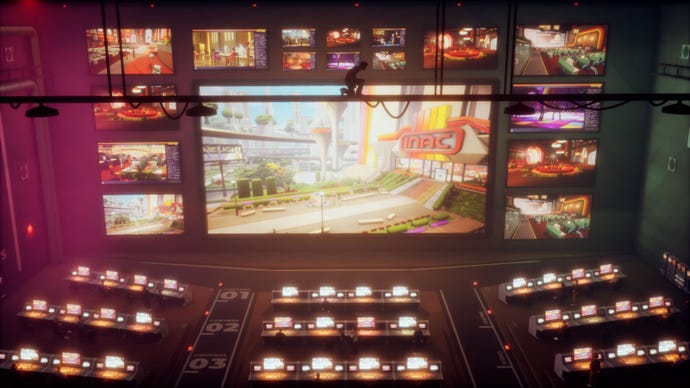
It's fun to, for example, jump Trevor accross the backs of animated swan decorations in a themed bar while, using Angela's hacking, you move the swans. That this is preceded by Trevor crawling through a sort of unvarnished behind-the-scenes section while escaping security underscores the synthetic nature of American Arcadia, as well as its by-design spectacle.
The game also mixes things up quite often, putting you in new situations that make Trevor's escape feel continually fresh, but still cohesive. Without spoiling too much, there are some later Trevor sections that reach psychedelic peaks of art design that offer a new perspective on Trevor's mindset, while bringing in extra demands in the platforming that push you to take a more imaginative, playful approach. They're a particular delight after some of the earlier chases expose that the platforming can be unforgiving at times, and may result in Trevor having to sprint through the same section of airport several times.
Angela's levels, which are mostly first-person creeping, tend to give more of the backstory and have more robust puzzles, but the stealth sections aren't quite as fun to actually play through, and some of the puzzles verge on diabolical. One insta-fail level where you have to hide all evidence of resistance activity around Angela's flat is particularly frustrating. What kind of secret operative doing illegal things has a giant whiteboard and a hundred sticky notes detailing said things? For Chrissakes, get it together, Angela. Her sections also sadly reveal that the character models, which are lovely emotive miniatures at a distance, look a bit more Sarcastic Parody Muppets when seen close up.
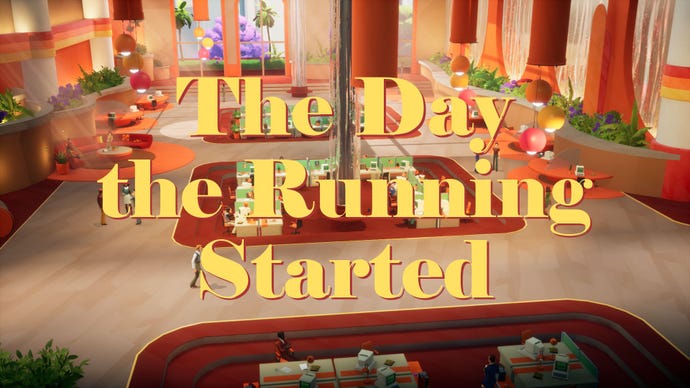
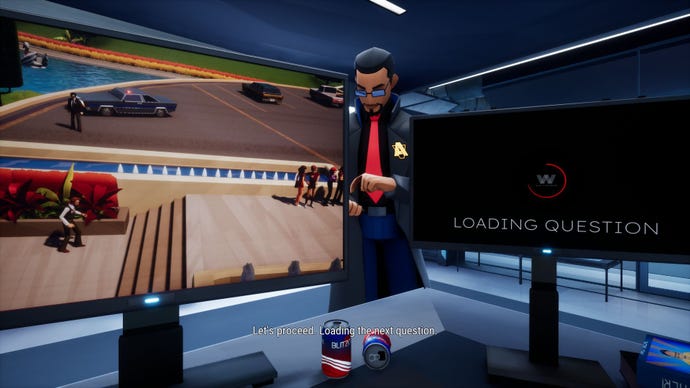
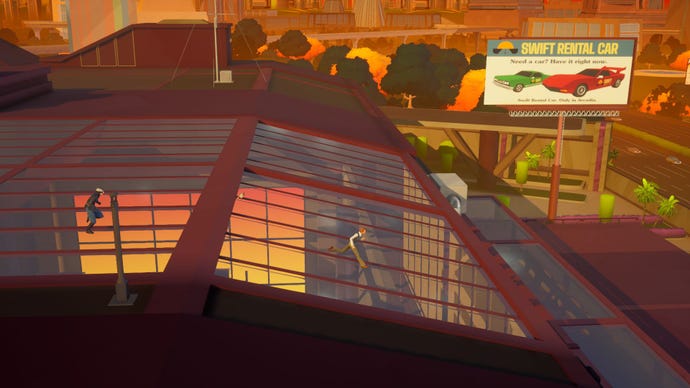
Despite this, Angela's sections offer an effective counterpoint to Trevor's splinting and ankle shattering jumps (thank God he had a latent talent for parkour just waiting to burst forth). They're also where you'll see more of the clues for the many twists that come as the story plays out, and while you'll expect some, there are so many of the bastards that it sort of becomes its own joke. You'll be taken by surprise by at least one - and one in particular I'm thinking of is actually very funny, too.
In that sense American Arcadia's story is maybe not the most original - it is, after all, immediately comparable with one of the most famous stories committed to cellulose in the last 25 years (Jesus, 25 years) - but it is told in a very cool, stylish and original way. It isn't quite a satire, and it's nowhere near smug enough to want you to think so, but it is an effective dramedy for the now, bringing to bear inumberable pieces of design and a sharp understanding of modern reality TV and social media. It's witty and well made, and will surprise you in fun ways when you least expect it.
Despite their respective annoyances, you can't help rooting for Angela and Trevor, and especially Trevor. He has, as he points out, not actually done anything wrong except to not be an awful fitspo influencer, like American Arcadia's most popular resident. By the end of the game you're catharting as hard as anyone at the prospect of victory at the entertainment company at the heat of the show. It's especially great to see how Trevor's concept of what victory in his own personal context means.
This review is based on a copy of the game provided by the publisher.









